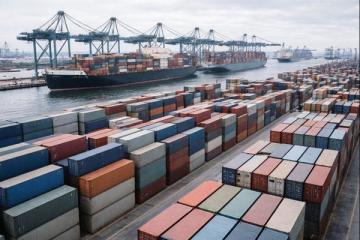
International freight transport and logistics insurer TT Club wants cargo owners to be more aware of safety issues arising from poorly packed containers and misdeclared goods. Urging them to make good practice in the supply chain part of their ESG (environmental, social and governance) policies.
TT Club’s analyses consistently indicate that two thirds of incidents related to cargo damage are caused or exacerbated by poor practices at the time of packing goods into a freight container. Such supply chain malpractice results in multi-million dollar losses, including tragic containership fires with loss of seafarers lives and significant delays. Extrapolating known figures, all such incidents are estimated to result in economic losses exceeding USD6 billion per year.
Cargo interests, whether retailers, manufacturers, traders, exporters and particularly importers, which rely so heavily on the global supply chains that transit thousands of miles of ocean and land transport need to take responsibility to ensure the risks are mitigated.
“The dangers are not just restricted to chemical cargoes, such as those used in paints, cosmetics, cleaning products, fertilisers, weedkillers and aerosols of all types. A wide variety of consumer goods, as well as components used in the manufacture of industrial products, domestics white goods and automobiles, if incorrectly handled in transit can cause major disasters,” comments Michael Yarwood, Managing Director, Loss Prevention at TT Club.
“The list is long and often surprising – BBQ charcoal, battery powered electronic devices, fireworks, hand sanitizer, wool, cotton, vegetable fibres, marble, granite and other building materials, fishmeal, seed cake and many more. Those involved in sourcing, importing, storing, supplying or selling such commodities should ensure their procurement and logistics standards are of the highest level.”
Sustainability and environmental impacts are subjects that are constantly in the public eye and there is an ever-heightened sense of urgency to act responsibly to reduce waste and the carbon footprint. However, the risks of supply chain dereliction frequently go unnoticed. Yet, mishandling of cargoes can result in unacceptable danger to those employed in their movement, to the environment, the general public, and not insignificantly to brand reputations.
And the concerns extend far beyond awareness of commodity-specific risks. Packaging and dunnaging already need to comply with safety and environmental standards, but there are increasing demands around recyclable and biodegradable materials. Furthermore, international attention is being directed urgently at phytosanitary risks – the avoidance of visible pest contamination in the movement of freight. Since not every responsible actor will physically see the potential contaminants, it is a matter of considering the origin of the goods being sourced, the location for packing, the season and biology of pests (when eggs or seeds are most likely), the compliance of the required packaging and the prevailing conditions at the time of packing the container(s).
As CSR (corporate social responsibility) and ESG policies come under increasing scrutiny, those entities that profit from the efficiencies and opportunities of the global and regional supply chains need now to be confident that those acting on their behalf in preparing, packaging, packing and dispatching their goods are doing so in accordance with industry standards, and within the applicable regulatory frameworks.
“So, what are ‘industry standards’? The simple answer is the Code of Practice for Packing of Cargo Transport Units (CTU Code),” advises Yarwood. “This is a joint publication of IMO[1], ILO[2] and UNECE[3]. It provides comprehensive information on all aspects of packing and securing of cargo in freight containers and other transport units across all sea and land transport modes. The Code guides not only those responsible for packing and securing cargo, but also those who receive and unpack the goods. It also addresses the vital issue of correct description and declaration of the goods, including any specific information about the treatment of dangerous goods.”
The full CTU Code is most comprehensive, but for those wishing to navigate it for guidance on their particular function or commodity, it might appear a little complex, especially for those unfamiliar with the processes. TT Club has therefore, along with its fellow partners in the Cargo Integrity Group*, compiled a ‘Quick Guide’ to the Code. This includes a Checklist of actions and responsibilities for those packing cargoes in freight containers specifically. The aim is to make the Code accessible to as many operatives as possible, encouraging them to adhere to the good practices that it specifies.
The complexity of supply chain relationships across the globe makes it no easy task to achieve material change in behaviour and practice. It is recognised that beneficial cargo owners, and in particular buyers and retailers, often hold an influential position in the supply chain and can exercise control on the way that specifications and contracts are drawn up between entities. They are regarded as vital in disseminating good practice information and insisting on compliance by those suppliers of goods and services who they employ either directly or indirectly.
The Global Shippers Forum (GSF) represents the interests of cargo owners in international supply chains. James Hookham, Secretary General, recognises the crucial role cargo owners have in promoting high standards of safe and ecologically-responsible container packing, stating, “In addition to the serious health and safety risks already described, poorly packed containers can also cause damage to adjacent cargoes in the event of incident and have been a cause of major consequential losses for shippers. GSF played a leading role in the development of the advice in the CTU Code and contributed to the writing of the ‘Quick Guide’ and the Container Packing Checklist.”
Furthermore, combatting the inadvertent transfer of invasive plant and animal species via contaminated cargoes and shipping containers is now a major priority for many governments around the world anxious to protect vital economic and ecological industries in agriculture and natural resources. The CTU Code and the associated guidance material sets out practical steps that can be taken to minimise this real and serious threat to trading nations.
James Hookham concluded, “Insofar as these practices will help minimise the impact of cargo movements on the environment and on people that come into contact with them, they are a valid item for inclusion on the ESG agenda of all responsible businesses.”
[1] International Maritime Organization
[2] International Labour Organization
[3] United Nations Economic Commission for Europe
* Container Owners Association (COA), the Global Shippers Forum (GSF), the International Cargo Handling Co-ordination Association (ICHCA) and the World Shipping Council (WSC).





